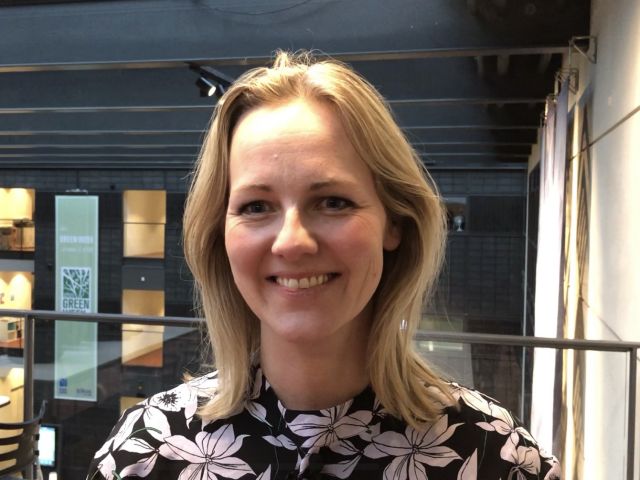If they trick us, we’ll trick them!

Sharing, buying and selling illegally copied study books is a growing tendency in Denmark. While publishers and interest organizations representing the publishing industry find it a “huge” problem, students at CBS see the trend as a fair response to the high cost of the books.
Illegal digitally copied study books, shared with classmates on a USB stick, by email or in a closed forum on Facebook mostly in the form of PDF files, are easy to find. The phenomenon has been growing in the last 18 months according to the Director of RettighedsAlliancen, Maria Fredenslund, whose job is to make it difficult to consume illegal content online.
“Since the summer of 2017 until now, there have been more than 2,000 instances of unauthorized copied study books shared with and bought by students. And that’s only the infringement that we have discovered at RettighedsAlliancen, so it’s a huge problem,” she explains.
Illegal for a good number of reasons
For Maria Fredenslund there are several reasons why sharing and selling copied study books without authorization is illegal.
“The reason why it’s illegal is because it has consequences. Not only for writers and publishers where property and profit have a lot of value, but also because it’s important to make sure that the original content of the books stays intact,” she says.
Copied study books can be manipulated and provide misinformation to the users
Maria Fredenslund, Director of RettighedsAlliancen
“At a time when untrustworthy information and content is a reality online, copied study books can be manipulated and provide misinformation to the users. Furthermore, being illegal, unauthorized copied study books can also have legal consequences for the users. So there are many reasons why this is a big problem,” Maria Fredenslund explains.
Not in it for the money
Professor of Strategy and International Management and Director of the Global Strategic Responsiveness initiative at CBS, Torben Juul Andersen, has written several study books about strategic management. He’s aware of the problem, but as far as he knows he hasn’t been affected by the trend. Although, if he ended up in a situation where one or more of his books where illegally shared, sold or bought, it wouldn’t worry him too much.
“If such a situation occurred, I would leave it to my publisher to deal with, because it’s more their concern than mine, which I completely understand because they commit resources to printing and distributing the books, and they do that to make a living,” he says.
As a professor and author of study books, Torben Juul Andersen is not driven by financial incentives.
“Profit isn’t the main drive for me. The driving force is the interest in the topic and the ability to make it available and accessible to a much broader audience than a standard academic article,” he explains.
Study books can be pretty expensive – especially for students who haven’t got much money. Can you understand why some students choose to sell, buy or share an illegal copy of a study book for a reduced amount of money or even for free?
“Yes, I can understand that. Books can be expensive. Although, I would never encourage students to commit illegal acts. But in my own teaching I rarely assign my own books as required reading. What I usually do is to refer to or use my own material to a limited extent, like a relevant chapter combined with different academic articles, so that you have a combination of different views and ways of explaining things. Therefore, in my teaching, there’s no requirement to buy expensive text books,” Torben Juul Andersen says.
Righteous stealing
Talking to students at CBS reveals that they are aware of the existence of illegal study books online, and some of them have even received or bought unauthorized copied study books themselves.
Study books are very expensive, so I understand why students, including myself, share, buy and sell illegally copied books
Oliver Christensen, CBS student
“I bought some illegally copied study books online once. I did it and would do it again to save money. For students, study books are very expensive, so I understand why students, including myself, share, buy and sell illegally copied books. On the other hand, it’s a big problem for the publishers, which I also understand, so it’s kind of a gray area I think,” CBS student Oliver Christensen says.
His fellow student, Mikkel, who doesn’t want to reveal his last name, agrees with Oliver Christensen that the cost of study books is high. In addition to this, he thinks there’s a growing problem with publishing companies regularly releasing new editions of study books.
“I think it’s understandable that people sell, buy and share illegally copied academic books because a lot of publishing companies frequently release the same books in new editions where they’ve only changed a few words, added a single chapter or changed something in the layout on the cover of the book, and make us believe that we have to buy the latest edition for, like, 600 DKK,” Mikkel says.
Another student, Anton, who also prefers not to reveal his last name agrees and taps into Mikkel’s argument.
“When distribution and publishing companies only change a few words from the original to sell a new edition, I don’t think that students feel that it’s fair, and I think it makes students feel more inclined to get their books illegally, because they think that it’s justified, like: ‘If they trick us, we’ll trick them’,” Anton says.
A matter of norms
While students at CBS think that the problem is caused by high prices and the publishers’ way of distributing the same books in several edited editions, Maria Fredenslund is convinced that the growing trend is linked to people’s norms and behavior online.
So for me, the norms and morals online seem to be an even bigger parameter of the problem than the legal issues
Maria Fredenslund, Director of RettighedsAlliancen
“It’s about responsibility, I think. In the physical world, most people wouldn’t steal a study book, but there appears to be other norms and morals on the internet. Also, the internet is very unregulated as opposed to the real world, and this makes users feel that it’s okay to download a PDF copy of a study book. So for me, the norms and morals online seem to be an even bigger parameter of the problem than the legal issues,” Maria Fredenslund says.
But for some students who haven’t got much money, it might be tempting to acquire their study books illegally. What would you say to them?
“I would, of course, recommend they don’t get their study books illegally. And I know there’s a need for continuous development in business models and new ways of doing business online, and that goes for the publishing industry as well the music and film industry. And right now there’s a lot of work being done by publishers and writers on how to handle the business of selling study books online, and I’m certain that there will be new ways of distributing educational books in the future,” Maria Fredenslund says.




































































































































Comments